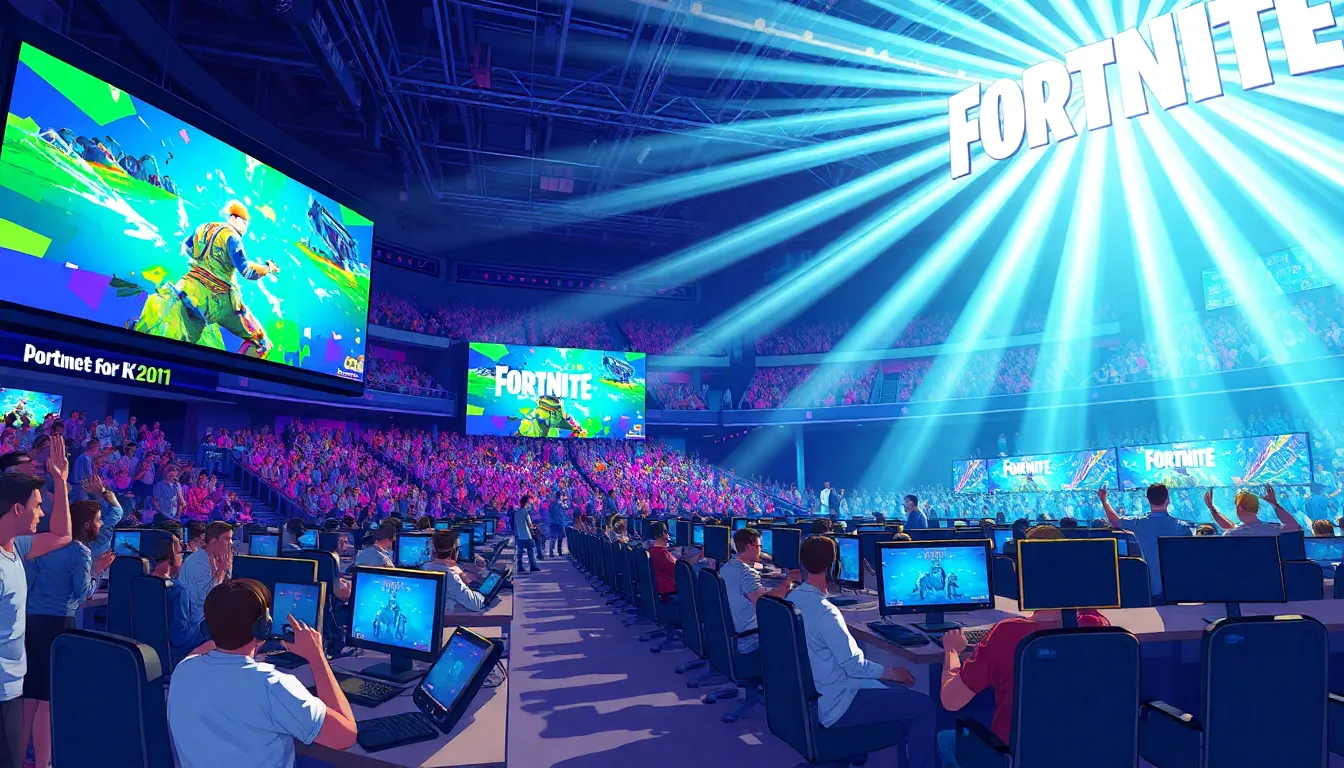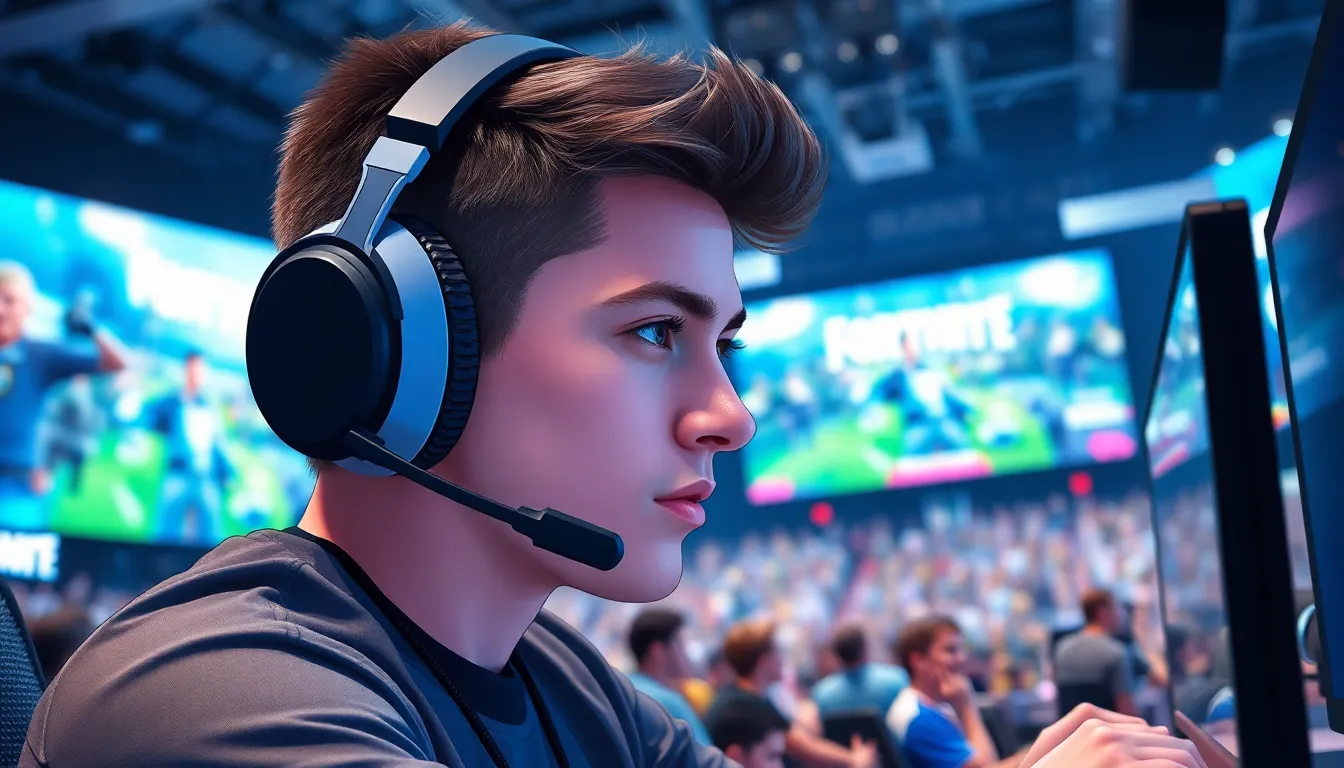Table of Contents
ToggleIn the vibrant world of gaming, Fortnite esports has taken center stage, captivating millions with its unique blend of building, battling, and, let’s be honest, some seriously questionable dance moves. This battle royale phenomenon isn’t just about surviving; it’s about thriving in a digital arena where strategy meets sheer chaos. With players zipping around the map and pulling off jaw-dropping stunts, it’s no wonder fans are glued to their screens.
As competitive play skyrockets, Fortnite esports has transformed from casual fun into a serious business, drawing in big-name sponsors and creating opportunities for gamers to turn their passion into profit. Whether you’re a seasoned pro or just someone who can’t resist a good llama, the world of Fortnite esports offers something for everyone. Buckle up, because this is just the beginning of an exhilarating ride through the pixelated battlegrounds where legends are born.
Overview of Fortnite Esports
Fortnite esports has rapidly transformed into a significant part of the gaming industry since its launch in 2017. Competitive events like the Fortnite World Cup attract millions of viewers globally, showcasing top-tier talent. Players compete for substantial prize pools, with the Fortnite World Cup 2019 offering a staggering $30 million in total prizes.
Major tournaments feature players from diverse backgrounds, creating a vibrant and inclusive community. Teams and organizations invest in professional players, recognizing the game’s potential to generate revenue through sponsorships and media rights. Epic Games, the developer, actively supports esports initiatives, hosting regular competitions and updates that keep the community engaged.
In addition to traditional competitive formats, Fortnite integrates unique elements like the Creative mode, encouraging players to showcase their skills and creativity. This aspect attracts audiences interested in innovative gameplay styles. Diverse competitions also include solo, duo, and squad formats, appealing to various player preferences.
Viewership statistics reflect the growing popularity of these esports events. In 2022, the Fortnite Championship Series attracted over 10 million live viewers across platforms. Such numbers highlight the game’s wide-reaching impact on the esports landscape.
Fan engagement plays a crucial role in the ecosystem, with platforms like Twitch and YouTube serving as primary outlets for streaming battles and analysis. Community-driven content, such as fan tournaments and social media interactions, further enhances this connection. Overall, Fortnite esports represents a dynamic environment that continues to evolve, fostering both competition and entertainment for players and viewers alike.
Key Tournaments in Fortnite Esports

Fortnite esports features a range of significant tournaments that showcase exceptional talent and foster competitive spirit.
The Fortnite World Cup
The Fortnite World Cup is one of the most prestigious events in the esports calendar. Held in 2019, it boasted a staggering $30 million prize pool. Players from around the globe competed, attracting over 2.3 million viewers during the final matches. Competitors participated in solo and duo formats, highlighting individual and team strategies. Epic Games organized the inaugural tournament, setting a high standard for future events. Recognition of exceptional skill transformed several individuals into global gaming icons. This tournament solidified Fortnite’s status in the competitive scene and demonstrated the game’s ability to unify players.
Fortnite Champion Series (FNCS)
The Fortnite Champion Series (FNCS) serves as a pivotal competitive circuit structured into seasonal formats. Since its inception, FNCS continuously evolves, accommodating new gameplay dynamics and community feedback. Each season features qualifying rounds that lead to a final event, where top teams compete for substantial cash prizes. Over 10 million live viewers tuned in for the 2022 Fortnite Championship Series, highlighting the event’s growing appeal. The FNCS encourages participation from players across different skill levels, creating an inclusive environment. With regular updates and exciting formats, FNCS exemplifies Fortnite’s commitment to fostering talent and maintaining a vibrant esports ecosystem.
Major Players and Teams in Fortnite Esports
Fortnite esports features numerous prominent individuals and teams that define the competitive scene. These key figures and organizations contribute significantly to the game’s popularity and spectacle.
Top Individual Players
Bugha, the 2019 Fortnite World Cup champion, captured the attention of fans with his exceptional skills. He demonstrated remarkable gameplay, earning a $3 million prize. Tfue remains another noteworthy player, known for his building prowess and creative strategies. His consistent performances maintain his status as a fan favorite. Clix, a rising star, has gained recognition for his quick reflexes and impressive tournament results. Notably, Asian players like Zexrow and Chap prioritize teamwork and communication, further enhancing their competitiveness. These players stand out in the Fortnite community, inspiring others through their achievements.
Prominent Esports Organizations
Team SoloMid (TSM) leads the charge, investing heavily in their Fortnite roster and securing top players. FaZe Clan follows closely, featuring a diverse group of gamers who excel in tournaments. NRG Esports showcases a strong lineup, leveraging the unique strengths of its players. 100 Thieves promotes a culture of excellence while prioritizing fan engagement, setting new standards in the esports industry. Cloud9 continues to establish itself with a solid presence in Fortnite competitions, attracting skilled players. Each of these organizations shapes the competitive landscape, creating pathways for players to thrive and succeed.
Impact of Fortnite Esports on the Gaming Community
Fortnite esports has significantly influenced the gaming community, enhancing engagement through competitive play. Major events such as the Fortnite World Cup and FNCS draw millions of viewers, creating a vibrant scene that encourages player participation. Over 2.3 million viewers tuned in for the 2019 World Cup finals, showcasing the game’s global reach.
A diverse group of players now participates in these tournaments, representing various backgrounds and skill levels. This inclusivity reinforces community bonds while fostering a sense of belonging among gamers. Players like Bugha and Tfue have not only achieved personal success but have also become role models for aspiring competitors.
Organizations such as Team SoloMid and FaZe Clan invest heavily in Fortnite talent, recognizing the opportunity to monetize this growing sector. Their support allows players to focus on honing their skills, which elevates overall competition quality. Instances of professional growth through sponsorship have become commonplace, benefiting both organizations and players alike.
Epic Games continuously nurtures this ecosystem, providing regular updates and competitive events that keep players engaged. The Creative mode further allows gamers to showcase unique skills, appealing to a broader audience and fueling community creativity.
Platforms like Twitch and YouTube serve as vital channels for fan engagement, where viewers connect with their favorite players. Community-driven content enriches the viewing experience, deepening relationships between players and fans. Overall, Fortnite esports has reshaped the gaming community, establishing a framework where competitive spirit and collaboration thrive.
Future Trends in Fortnite Esports
Continued innovation in Fortnite esports shapes its future. Emerging technologies like virtual reality and augmented reality are attracting players and enhancing gameplay. Integration of these technologies into tournaments can elevate viewer experiences, offering immersive environments that captivate audiences.
Growth of mobile gaming influences competitive dynamics. Fortnite’s mobile version opens opportunities for diverse player participation. Expanding accessibility broadens the talent pool, allowing new competitors to emerge.
Sponsorship deals are increasingly crucial. Major brands recognize the potential of Fortnite esports to reach younger demographics. Investments from top companies boost prize pools and elevate tournament prestige.
The rise of content creators impacts the esports landscape. Influencers expand reach through platforms such as Twitch and YouTube. Collaboration between esports teams and content creators generates unique marketing strategies that engage wider audiences.
Regular updates from Epic Games keep the competition fresh. New game mechanics and balance changes maintain player interest and ensure a dynamic competitive environment. Adaptability becomes essential as players develop strategies to stay ahead.
Another trend involves inclusivity efforts within the competitive scene. Initiatives that promote underrepresented groups contribute to a diverse community. Emphasizing a welcoming atmosphere strengthens player relationships and enhances overall participation.
Lastly, the viral nature of Fortnite enables community-driven events. Player-organized tournaments encourage participation and foster grassroots competition. These events often attract large audiences, reinforcing Fortnite’s cultural significance within gaming.
Fortnite esports continues to evolve, reflecting broader trends within the gaming industry, demonstrating its commitment to innovation, inclusivity, and community engagement.
Fortnite esports stands at the forefront of the gaming revolution. Its unique blend of competitive gameplay and community engagement has transformed it into a cultural phenomenon. With major tournaments drawing millions of viewers and significant prize pools, the scene continues to thrive.
As the esports landscape evolves, Fortnite is poised to embrace new technologies and broaden its reach. The commitment to inclusivity and community-driven events ensures that players from all backgrounds can participate and shine.
With ongoing support from Epic Games and growing interest from sponsors, the future of Fortnite esports looks bright. This dynamic environment promises to captivate audiences and nurture talent for years to come.




